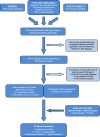Training of adult psychiatrists and child and adolescent psychiatrists in europe: a systematic review of training characteristics and transition from child/adolescent to adult mental health services
- PMID: 31196080
- PMCID: PMC6567390
- DOI: 10.1186/s12909-019-1576-0
Training of adult psychiatrists and child and adolescent psychiatrists in europe: a systematic review of training characteristics and transition from child/adolescent to adult mental health services
Abstract
Background: Profound clinical, conceptual and ideological differences between child and adult mental health service models contribute to transition-related discontinuity of care. Many of these may be related to psychiatry training.
Methods: A systematic review on General Adult Psychiatry (GAP) and Child and Adult Psychiatry (CAP) training in Europe, with a particular focus on transition as a theme in GAP and CAP training.
Results: Thirty-four full-papers, six abstracts and seven additional full text documents were identified. Important variations between countries were found across several domains including assessment of trainees, clinical and educational supervision, psychotherapy training and continuing medical education. Three models of training were identified: i) a generalist common training programme; ii) totally separate training programmes; iii) mixed types. Only two national training programs (UK and Ireland) were identified to have addressed transition as a topic, both involving CAP exclusively.
Conclusion: Three models of training in GAP and CAP across Europe are identified, suggesting that the harmonization is not yet realised and a possible barrier to improving transitional care. Training in transition has only recently been considered. It is timely, topical and important to develop evidence-based training approaches on transitional care across Europe into both CAP and GAP training.
Conflict of interest statement
The authors declare that they have no competing interests.
Figures
References
-
- Brodie I, Goldman R, Clapton J (2011, Revised 2014). Mental health service transitions for young people. Research briefing 37. Social Care Institute for Excellence www.scie.org.uk/publications/briefings.
-
- Burke L, Kirkham J, Arnott J, Gray V, Peak M, Beresford MW. The transition of adolescents with juvenile idiopathic arthritis or epilepsy from paediatric health-care services to adult health-care services: a scoping review of the literature and a synthesis of the evidence. J Child Health Care. 2018;22(3):332–358. doi: 10.1177/1367493517753330. - DOI - PubMed
Publication types
MeSH terms
Grants and funding
LinkOut - more resources
Full Text Sources
Miscellaneous



